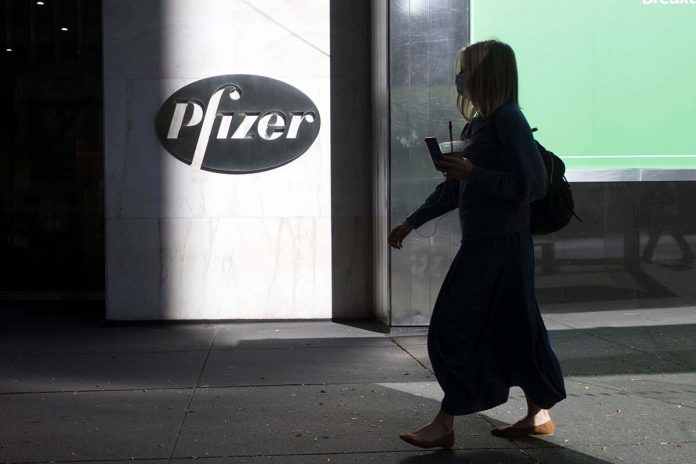
Ted Shaffrey/AP/Shutterstock
UK regulators have authorised a covid-19 vaccine created by Pfizer and its partner BioNTech for emergency use, meaning that vaccine rollout is planned to begin soon. Here, we answer questions about the science of the vaccine, who will get it first, how confident we can be in the authorisation process and the logistics of vaccinating everyone in the UK.
Science
How effective is the vaccine?
About 95 per cent. The phase 3 trials of the Pfizer/BioNTech vaccine involved 42,000 people, about half of whom got the experimental vaccine and the rest a placebo. In total, 170 people fell ill with covid-19. Only eight of them were in the vaccine group; 162 had received the placebo. So around 5 per cent of cases were in the vaccine group, which is where the 95 per cent figure comes from. That is a very healthy number: the World Health Organization (WHO) has said it would be happy with 50 per cent.
What is in the vaccine?
The active ingredient is messenger RNA that carries instructions for making the virus’s spike protein, which it uses to gain entry to cells. The mRNA is synthetic, not extracted from actual viruses. It is delivered in a tiny sphere of inert fatty material called a lipid nanoparticle.
Advertisement
The RNA-bearing nanoparticles are suspended in saline solution and injected into muscle tissue in the upper arm. The mRNA is then taken up by specialist immune cells, which follow its instructions to make the spike protein, just as they would do if they had become infected with the actual virus.
The spike protein is recognised as foreign by the immune system, which mounts an attack against it. Antibodies, B cells and T cells are activated, according to Uğur Şahin, the chief executive of the small German company BioNTech that co-developed the vaccine with US drug giant Pfizer. An immune memory is also laid down, he says, which means the immune system has learned how to defeat the pathogen and is primed to mount a swift response if it encounters the coronavirus again.
How long does the immune memory last?
It’s hard to say at this point, because the clinical trials weren’t set up to answer that question, and in any case, they only began dispensing second doses of the vaccine four months ago. The WHO says that a minimum of six months would be acceptable. It will become clearer as time marches on and the volunteers continue to be monitored. Sahin says he expects protection to last “months or even years”. Given what we know about natural immunity that looks about right, says Eleanor Riley at the University of Edinburgh in the UK. She envisages people needing annual boosters, at worst.
How long does it take for immunity to develop fully after vaccination?
The trial began assessing immunity seven days after the second shot. We know that protective immunity builds up within four weeks of the first dose, but Sahin says that it appears to develop earlier than that. Further details will be published in a matter of days, he says.
What happens to the mRNA in the body?
It is active for a few days then decays rapidly.
It’s a two-shot vaccine, so what happens if people miss their second shot? Is a single shot still protective?
Two shots are needed, and the second shot is required to attain immunity. The gap between doses in the trial ranged between 19 and 42 days. Only 2 per cent of people in the trial missed their second dose so it isn’t entirely clear what happens under those circumstances.
Are there any side effects?
Sometimes, but they are mild. In the trial, the vaccine was generally well-tolerated, and an independent data monitoring committee reported no serious safety concerns. The worst side effects were fatigue and headaches after the second dose. About 4 per cent of people reported fatigue and 2 per cent a headache. Other side effects were pain at the injection site and muscle pain. These are “common reactions you would have with vaccination”, says Özlem Türeci, chief medical officer at BioNTech. Older adults reported fewer and milder side effects.
Does it work in older people?
Yes. Trial participants were aged up to 85, and the efficacy in people over 65 was 94 per cent – a tiny bit lower than the overall number but still very protective, and much higher than some vaccine experts feared. The vaccine hasn’t been tested in people aged over 85.
What about other vulnerable groups?
The vaccine appears to be equally effective regardless of recipients’ age, sex and ethnicity, according to BioNTech. It has been tested extensively in people who have already had the virus and doesn’t cause any ill effects. It has also been tested in people with “stable” pre-existing conditions – also known as comorbidities – including diabetes, cancer, hepatitis B, hepatitis C and well-managed HIV. Their response was as good as anyone else’s.
People with serious or worsening comorbidities will also be eligible for the vaccine. BioNTech says it has data on this group and will release it in a matter of days.
Does it protect everyone?
No. In the trials, out of about 20,000 people who were given the vaccine, eight caught covid-19 and one became seriously ill. In contrast, 164 people who received the placebo fell ill, nine severely. It isn’t known why some people didn’t respond to the vaccine. But a success rate of 95 per cent is about as good as it gets with any vaccine.
Does it stop people from catching and transmitting the virus?
We still don’t know. The trial was designed to test for symptomatic covid-19 and confirmed infection with the virus. Assessing whether the vaccine prevents transmission – which is probably a prerequisite for attaining vaccine-induced herd immunity – is much harder. But Pfizer says it is carrying out more studies on this important question and will release information soon.
Some vaccines can paradoxically make a disease worse through a process called antibody-enhanced disease. Is that a risk?
Yes, theoretically. But it hasn’t been seen with this vaccine or any other against covid-19, and hasn’t occurred naturally, as sometimes happens with other viruses.
Has the the full data from the trial been published yet?
No, it hasn’t, but there is nothing sinister about that. Companies can release news to the market as soon as they have it, which is a much speedier process than preparing a scientific manuscript. According to Pfizer, every last detail of the science will be submitted to a top-ranking peer-reviewed journal as soon as it is ready. It will then be up to the journal how long it takes to publish.
Eligibility
Who is first in the queue in the UK?
When a vaccine is approved it is customary to first offer it to people who took part in the clinical trial but received the placebo. However, as the trial wasn’t done in the UK, there is nobody in this category.
Care home residents and their carers have the highest priority, according to a priority system devised by the UK’s Joint Committee on Vaccination and Immunisation. But there are problems with delivering this particular vaccine to care home residents because it needs to be transported at very cold temperatures in special cases that carry around 1000 doses. These cases cannot be broken up for distribution, which makes it very hard to get the required doses into individual care homes.
Next in line are people aged over 80 and frontline healthcare workers, followed by people aged over 75, then people in increasingly younger age groups and/or with underlying health conditions.
Will anyone be excluded from the vaccine programme?
Yes. Pregnant women and children under 16 won’t be eligible, at least at first. The vaccine hasn’t been tested on pregnant women or children under 12, and there isn’t enough data on children age 12 to 15. But trials in those groups are ongoing or planned.
Everyone else can get it?
Yes, but most will have to wait their turn. According to Sean Marett at BioNTech, the exact delivery schedule depends on how fast the factories can churn it out and where else the vaccine is approved, as the company is committed to equitable access. “We will deliver as many doses as we can as quickly as we can,” he says.
Regulatory Process
What does “temporary authorisation for emergency use” mean?
Exactly what it says on the tin. The UK’s Medicines and Healthcare products Regulatory Agency (MHRA) has expedited the approval process in recognition of a public health emergency, and could rescind the approval just as quickly. But that is highly unlikely as it says it has done a thorough assessment of the safety and efficacy data and has seen nothing to give it reason not to approve.
Will the vaccine inevitably progress from temporary to full authorisation?
Probably, but it isn’t a given. Pfizer says it expects so, but that is in the hands of the regulators.
It all happened very quickly, can we be confident corners weren’t cut?
Yes. The MHRA is an independent body and so is the Commission on Human Medicines, which also had a say in the decision to approve the vaccine in the UK. Even though the MHRA only received the full clinical trial data just over a week ago, the vaccine developers have been submitting information since October, which has been subject to ongoing review.
The European Medicines Agency, the drug regulator that approves covid-19 vaccines for the European Union, said in a statement that its process for assuring the safety and efficacy of the vaccine is based on more evidence and more checks than the emergency authorisation used in the UK.
According to the vaccine developers, the MHRA asked for exactly the same amount of information as any other regulatory agency. It has been working 24/7 to assess it, says Türeci.
Are other countries likely to approve the vaccine soon as well?
Yes. Pfizer/BioNTech have also applied for approval in the US, EU, Australia, Canada, Japan and New Zealand, and say they are preparing to submit applications to other regulatory agencies around the world. Decisions are expected from the US and EU this month.
Logistics
How many doses is the UK getting?
In total, the UK government has pre-ordered 40 million single doses, which is enough for 18 million people assuming double dosing and about 10 per cent wastage. But it won’t get all 40 million at once. The full order will be delivered in batches over the course of 2020 and 2021.
When will the vaccine reach the UK?
The first batch is currently being packaged at Pfizer’s vaccine factory in Puurs, Belgium, and will be dispatched to the UK by lorry and plane as soon as it is ready – possibly as early as the coming weekend. UK health minister Matt Hancock has said he expects the UK to receive 800,000 doses over the next few days.
When will vaccination start?
Again, as soon as possible.
Doesn’t the vaccine require complicated cold storage?
Yes and no. For long-term storage – meaning for six months or so – the vaccine has to be kept at -70° C, which requires specialist cooling equipment. But Pfizer has invented a distribution container that keeps the vaccine at that temperature for 10 days if unopened. These containers can also be used for temporary storage in a vaccination facility for up to 30 days as long as they are replenished with dry ice every five days. Once thawed, the vaccine can be stored in a regular fridge at 2°C to 8°C for up to five days.
Could the supply chain be disrupted on 1 January by the end of the Brexit transition period following the UK leaving the EU?
Possibly. But according to Marett, “if there is disruption we will find another route”.
Where will people be vaccinated?
The usual places: GP surgeries, health centres and hospitals. People will be invited by the NHS. The entire supply is going to the various NHS bodies in the UK and nobody will be able to jump the queue by buying a vaccine privately, according to Pfizer.
Could something still go wrong?
Yes, but that is highly unlikely. Vaccine effectiveness in the real world is almost always lower than efficacy in trials, but the drop-off would have to be spectacular to dip below the 50 per cent threshold accepted by the WHO.
There could still be rare severe adverse effects down the road, especially as mRNA vaccines are a new technology and have never been rolled out on a massive scale before.
Vaccine clinical trials aren’t big or long enough to rule out rare but serious side effects, which sometimes appear months or even years after vaccination. People who have been vaccinated will be followed up for two years to ensure that there are no serious adverse effect waiting in the wings.
But these are small, theoretical risks. As Fiona Watt at the UK Medical Research Council (MRC), said: “This is great news.”
Sign up to our free Health Check newsletter for a round-up of all the health and fitness news you need to know, every Saturday
Article amended on
4 December 2020
We clarified that the UK is in a transition period after leaving the European Union
More on these topics:











